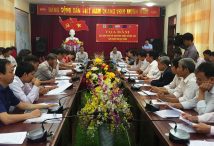At present, there are many policies, programs, and projects in the local area supporting the development of agricultural production, cooperative groups, and cooperatives, but sometimes they do not reach farmer’s activities. Meanwhile, farmers face many difficulties but proposals from their real situation and their voices are still not raised to relevant stakeholders. So how to connect them?
Viet Nam Farmers’ Union (VNFU), the national implementing agency of AFOSP-MTCP2 in Vietnam, coordinated with local farmer unions (FU) to organize two pilot roundtable discussions at the district level on finding solutions to support safe vegetables production cooperative groups in Thai Binh province where four vegetables cooperative groups are supported by the program. The participants were leadership representatives of the District/City Party Committee, the People’s Committee, and relevant Departments, FUs at all levels, some enterprises, and members of safe vegetable production cooperative groups supported by AFOSP-MTCP2.

Thanks to these discussions, the voice of the farmers, especially their problems on production, business, and their proposals, were raised to local authorities and relevant stakeholders who listened and had a better understanding of the actual performance of the cooperative groups and then find the appropriate ways to support them. The farmers’ problems will be gradually solved and such activities will continue to be submitted to higher levels for resolution through provincial roundtable discussions.
After the roundtable discussion, the attention of farmer organizations (FOs), local authority, enterprises, research institutions to the development of cooperative groups, and cooperatives was raised. Also, resources were mobilized for the development of cooperative groups and cooperatives.
Particularly, in Vu Thu district, the District People’s Committee assigned the Agriculture Division to conduct a survey on soil and safe vegetable seeds to support brand name building for safe vegetables in Trung An commune, assigned Trung An Commune Party Committee, People’s Committee to support cooperative group members with specific actions such as providing them with young potato trees, pesticides, and fertilizers, and direct the commune unions to support the cooperative group by helping them buy fertilizer, seeds, machines and equipment for soil- involved works.
In Thai Binh City, the City Party Committee assigned Vu Phuc commune agricultural service cooperative to coordinate on the irrigation and upgrading of irrigation systems, and assigned staff of the Economic Infrastructure Department to make a survey for building a pilot model, assigned the Economic Department support to build a safe vegetable brand and cooperate to ensure output for farmers. Moreover, the Provincial FU also agreed with the orientation on lending the Commune FU with VND 400 million (USD 17,130) from Supporting Fund for Farmers. Some enterprises such as Toan Van company, Lam Thao company started to cooperate with farmers by giving support through fertilizer, cooperated with provincial FU to organize training on fertilizer usage, and provided 5 kilograms of Potassium for each delegate.
The facilitating factors that helped achieve these positive results include the important roles of FU in linking cooperatives/cooperative groups with other relevant stakeholders; FU and farmers well integrated their knowledge and skills on policy advocacy provided by MTCP2 NIA through training courses on policy advocacy such as Farmers Advocacy Consultation Tool (FACT); and the existing policy for the development of cooperative models in the local area.
Although it is just the initial success, the results of the discussion showed that the consensus of all stakeholders, from the state, scientists, entrepreneurs to farmers in the development of cooperative groups is very important.
From this initiative, VNFU also faced challenges including the limited capacity of FU staff, particularly on facilitating, planning, and policy advocacy; and farmers are still confused and hesitant on talking about their difficulties and proposals.
VNFU then recommends that there is a need to improve capacity, especially in policy advocacy for NIA staff, groups, cooperatives in various forms such as training, roundtables, dialogues, meetings, etc. The support of the AFOSP-MTCP2 for the cooperative groups is very small compared to their actual need due to budget limitation, so it is necessary to mobilize various resources for supporting cooperative group development. Due to the success and impact of these roundtable discussions, NIA should expand to organize more for other cooperatives/cooperative groups in different areas.

Comments are closed